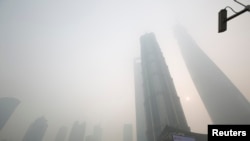BEIJING —
Commentaries by two of China's most influential news outlets suggesting that an ongoing air pollution crisis was not without a silver lining drew a withering reaction on Tuesday from internet users and other media.
In online commentaries published on Monday, state broadcaster CCTV and the widely read tabloid the Global Times, published by the Communist Party's official People's Daily, both tried to put a positive spin on China's smog problem.
The Global Times said smog could be useful in military situations, as it could hinder the use of guided missiles, while CCTV listed five “unforeseen rewards” for smog, including helping Chinese people's sense of humor.
While both pieces have since been deleted from their websites, Chinese newspapers lost little time in denouncing their point of view in an unusual case of state media criticizing other state media, showing the scale of the anger.
“Is the smog supposed to lift if we laugh about it?” wrote the Beijing Business Today, published by the city government's official Beijing Daily. “Smog affects our breathing. We hope it does not affect our thinking.”
The Dongguan Times, from a heavily industrial city close to the border with Hong Kong, said CCTV's comments were so bizarre people did not know “whether to laugh or cry.”
“There's nothing funny about the health dangers of smog,” it wrote.
Even the main Xinhua news agency - which had initially picked up CCTV's commentary - weighed in, writing on one of its official microblogs late on Monday that it was “totally inappropriate” to make fun of air pollution.
Air quality in cities is of increasing concern to China's stability-obsessed leaders, anxious to douse potential unrest as a more affluent urban population turns against a growth-at-all-costs economic model that has poisoned much of the country's air, water and soil.
Large parts of eastern China, including the country's prosperous and cosmopolitan commercial capital Shanghai, have been covered in a thick pall of smog over the past week or so, though Beijing's normally filthy air has been relatively clear.
Users of Sina Weibo, China's version of Twitter, also vented their outrage over the CCTV and Global Times comments.
“The smog crisis covering large parts of China has revealed the failure of the government's development strategy of only going after GDP (growth). CCTV is shameless in trying to cover up for their masters,” wrote Wu Bihu, a professor at the elite Peking University.
“The Global Times thinks that pollution will cause missiles to miss their targets... How shameful! So that's what all this smog has really been about. People had thought it was just bad pollution,” state television in the eastern province of Shandong wrote on one of its microblogs.
In online commentaries published on Monday, state broadcaster CCTV and the widely read tabloid the Global Times, published by the Communist Party's official People's Daily, both tried to put a positive spin on China's smog problem.
The Global Times said smog could be useful in military situations, as it could hinder the use of guided missiles, while CCTV listed five “unforeseen rewards” for smog, including helping Chinese people's sense of humor.
While both pieces have since been deleted from their websites, Chinese newspapers lost little time in denouncing their point of view in an unusual case of state media criticizing other state media, showing the scale of the anger.
“Is the smog supposed to lift if we laugh about it?” wrote the Beijing Business Today, published by the city government's official Beijing Daily. “Smog affects our breathing. We hope it does not affect our thinking.”
The Dongguan Times, from a heavily industrial city close to the border with Hong Kong, said CCTV's comments were so bizarre people did not know “whether to laugh or cry.”
“There's nothing funny about the health dangers of smog,” it wrote.
Even the main Xinhua news agency - which had initially picked up CCTV's commentary - weighed in, writing on one of its official microblogs late on Monday that it was “totally inappropriate” to make fun of air pollution.
Air quality in cities is of increasing concern to China's stability-obsessed leaders, anxious to douse potential unrest as a more affluent urban population turns against a growth-at-all-costs economic model that has poisoned much of the country's air, water and soil.
Large parts of eastern China, including the country's prosperous and cosmopolitan commercial capital Shanghai, have been covered in a thick pall of smog over the past week or so, though Beijing's normally filthy air has been relatively clear.
Users of Sina Weibo, China's version of Twitter, also vented their outrage over the CCTV and Global Times comments.
“The smog crisis covering large parts of China has revealed the failure of the government's development strategy of only going after GDP (growth). CCTV is shameless in trying to cover up for their masters,” wrote Wu Bihu, a professor at the elite Peking University.
“The Global Times thinks that pollution will cause missiles to miss their targets... How shameful! So that's what all this smog has really been about. People had thought it was just bad pollution,” state television in the eastern province of Shandong wrote on one of its microblogs.





